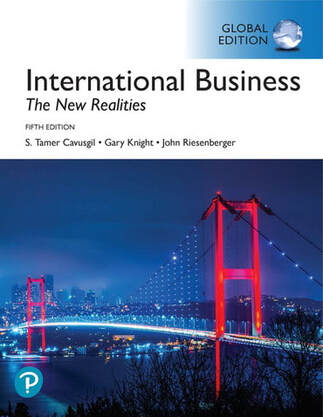51st AIB UK & Ireland Chapter Conference
“Navigating Global Technological, Political and Sustainability Challenges”
24 – 26 April 2025, Surrey Business School, University of Surrey, Guildford
Chair of Conference: Dr Abderaouf Bouguerra
|
CALL FOR PAPERS
Conference Programme PAPER SUBMISSION AWARDS AND PUBLICATIONS DOCTORAL COLLOQUIUM WAIB SPEED MENTORING METHODS WORKSHOPS PAPER AND CAREER DEVELOPMENT WORKSHOPS REGISTRATION AND FEES VENUE AND LOCATION ACCOMMODATION CONTACT IMPORTANT DATES:
VENUE:Aston Business School at Aston University, Birmingham
|
CALL FOR PAPERS In recent years, the global business environment has witnessed unprecedented disruptions and challenges such as the COVID-19 pandemic, Brexit, geopolitical tensions and expansion of the conflict zones, energy crisis and economic downturns, the surge of political populism trends, and climate change. Such international disruptions undoubtedly can alter the cross-border activities of firms, offering both internationalisation threats and opportunities. For instance, due to the COVID-19 pandemic and Brexit, many firms have been challenged by disruption in their supply chain, reduction in their national and international demand or restrictions in access to financing.
Furthermore, the ever-evolving technological advancement has changed the international business game. On the one hand, the emergence of artificial intelligence (AI) and new digital technologies such as social media, AI-driven marketing tools, and digital platforms like the metaverse have provided a wider outreach for firms to new customers in international markets. On the other hand, failure to invest in and adapt to the latest technologies, along with cybersecurity and privacy issues, can disadvantage firms in the competitive international markets, pushing them to consider the option of reducing their international activities or exiting from foreign markets. In response to such disruptions, international firms need to make strategic transformation decisions and shift to more flexible and agile business models. It begs for the employment of innovation and new technologies to the firm’s operation, re-orchestration of their global value chains, inter-firm knowledge collaboration and R&D, and taking advantage of foreign market context advantages. However, such strategic decisions need to be well aligned with the new world orderand international business policy, as well as the recent changes to economic geography, while prioritising sustainable business practices. We invite scholars to join this debate at the 50th AIB UK & Ireland Chapter Conference, where we further scrutinise the evolution of international business as a response to the recent disruptions. This conference theme further explores the new internationalisation trends and practices applied by small and medium (SME) internationalisers and multinational enterprises (MNEs). We also invite research on non-linear internationalisation strategy, which explores the wave of de- and re-internationalisation resulting from the disruptions and firms’ responses. However, in the tradition of previous chapter conferences, we welcome papers that explore different international business topics pertinent to the conference tracks below. Conference Tracks
Track 1: General track Track Chairs: Surender Munjal (Aston University) and Yama Temouri (Khalifa University of Science and Technology, UAE) The AIB-UKI conference builds on a tradition of inclusiveness and thematic comprehensiveness. The ‘general’ track welcomes all IB papers, particularly ones that are beyond the scope of the specific conference tracks. Theoretical and conceptual papers, as well as those that look into new empirical research methodologies, may fall into this track. Track 2: Global Value Chains: Contents and Discontents Track Chairs: Ari van Assche (HEC Montreal, Canada) and Jun Du (Aston University) This track invites papers that address issues around the intricate world of global value chains and explores the challenges and opportunities they present. In an era of wavering globalisation, the complexities of global value chains have become increasingly scrutinised. Firms, both large and small, have since long integrated into global value chains to improve their productivity and flexibility, yet many of these benefits have turned sour during the turbulent times of the COVID-19 pandemic and rising techno-nationalism. Growing pressures to hold lead firms accountable for human rights and environmental violations in their value chains have also made them grapple with how to make them more sustainable. This track aims to shed light on these discontents while unearthing innovative firm strategies and public policies to enhance firm resilience, tackle sustainability issues, navigate geopolitical challenges, and harness the power of technological upgrading. Join us for an intellectually stimulating and thought-provoking gathering of global minds and foster meaningful discussions, share ground-breaking research, and address the critical issues at the forefront of today's business landscape. Areas of interest for paper submissions include but are not limited to i. Resilience: Identifying mechanisms and policies to enhance firm competitiveness, adaptability, and responsiveness within global value chains; ii. Sustainability issues: Unveiling sustainable practices, green initiatives, and ethical considerations to minimise environmental impact and foster responsible business conduct; iii. Geopolitics: Understanding the influence of political, economic, and cultural dynamics on global value chains and exploring strategies and policies to mitigate associated risks; iv. Technological upgrading: Analysing the role of emerging technologies, digital transformation, and innovation in driving efficiency, productivity, and competitiveness within value chains. Track 3: International Entrepreneurship, Export Challenges, and Intermittent Exporting Track Chairs: Antonella Zucchella (University of Pavia, Italy) and Razieh Sadraei (Coventry University) In dealing with the turbulent global environment, international entrepreneurs and entrepreneurial firms play a critical role in identifying and pursuing cross-border opportunities. This track seeks contributions that delve into internationalisation processes as entrepreneurial endeavours focused on discovering, evaluating, and seizing international business opportunities. For instance, we seek to explore the internationalisation dynamics and challenges of early internationalisers such as born global firms and international new ventures. Topics include but are not limited to drivers and consequences of international opportunity-discovery/creation, entrepreneurial decision-making logics in internationalisation, digital platforms in enabling early internationalisation for entrepreneurial firms, collaborative business models on the internationalisation outcomes of entrepreneurial firms, international networks and alliances in supporting the implementation and growth of new internationalisation business models. On the other hand, this track also welcomes paper submissions that explore the internationalisation of well-established SMEs in regard to the extent to which small and medium internationalisers address the challenges of doing business in foreign countries. Topics include but are not limited to the motivations, barriers, capabilities, and support measures that underlie SME internationalisation, as well as the process of market selection and entry modes (exporters and micro-multinationals). Given the complex business environment in recent years, we are particularly inviting explorations on the non-linear internationalisation strategies of SMEs, including Intermittent Exporting, as well as subsequent de- and re-internationalisation of SMEs. Track 4: International Business, Innovation & Geography Track Chairs: Marianna Marra (University of Sussex) and Dalila Ribaudo (Aston University) This track invites paper submissions focusing on the contemporary dynamics surrounding the internationalisation of R&D activities by MNEs and their evolving role within the global innovation landscape. The ascent of service offshoring and information technology has reshaped innovation networks, where MNEs play a pivotal role. Recent economic challenges, including the COVID-19 pandemic and shifting geopolitical landscapes, have accelerated R&D internationalisation and prompted strategic reevaluations. While well-established MNEs from advanced economies continue to wield substantial influence, a shift is evident in the global landscape of knowledge generation and dissemination. Emerging players and regions are now assuming prominent roles, particularly exemplified by the increasing significance of developing economies in driving the diffusion of environmental innovations. Host countries, regions, and cities hosting the R&D facilities of MNCs stand to gain from notable advantages, including heightened economic growth, job opportunities, and the positive externalities of technological advancements. Conversely, non-host countries may confront challenges marked by the absence of these economic benefits and technological advancements. The internationalisation of R&D is an intricate and multifaceted phenomenon, the comprehension of which holds paramount importance. A comprehensive understanding of the driving forces, the geographic distribution of international R&D activities, and their repercussions for nations and regions is essential. We welcome conceptual and empirical papers drawing from international business, international economics, and economic geography to enrich our comprehension of this vital field. Track 5: The Intersection of SDGs and the Dark & Bright Sides of International Business and Society Track Chairs: Chris Jones (Aston University) and Elena (Liena) Kano (University of Calgary, Canada) The Sustainable Development Goals (SDGs) have emerged as a powerful framework to guide global efforts towards a more sustainable and equitable future. Multinational enterprises (MNEs) can play a critical role in enacting sustainability strategies across borders. However, MNEs’ activities can also have potential negative impacts on the environment, society, and governance (ESG). This conference track seeks to explore the bright and dark sides of international business, by examining how international business practices can either facilitate or hinder progress towards the SDGs and by highlighting the potential risks and unintended consequences of these practices. We welcome papers that address a wide range of issues, including but not limited to corporate social responsibility/irresponsibility, human rights violations and strategies to combat those, environmental impacts, corruption, tax evasion and avoidance, business ethics, fair-trade, non-market strategy, and modern slavery. We invite contributions that explore roles and responsibilities on multiple actors in advancing SDGs, including individuals, firms, regulators/governments, NGOs, etc. By shedding light on the interaction of the bright and dark sides of international business, we hope to contribute to a more nuanced and comprehensive understanding of the challenges and opportunities for sustainable development in the 21st century. Track 6: The Political Economy of the MNE-Government Relationship Track Chairs: Sumon Bhaumik (University of Sheffield) and Agelos Delis (Aston University) MNE strategies are influenced by home and host country institutions and governance. Unsurprisingly, there is a long tradition in the IB literature to explore the relationship between MNEs and home and host country governments. Interactions between MNEs and host country governments have spawned the literature on obsolescing bargaining and its extensions and non-market strategies of MNEs, among others. The role of home country governments has been discussed largely in the context of emerging market economies, where home-country government support may matter significantly for internationalisation, given that the institutional environment is often unsupportive. More recent studies have discussed how the nature of the government (e.g., populist) may influence MNE strategies. However, this line of research is still emergent, and there is a need for greater theorising as well as more empirical research to give us a deeper understanding of MNE-government relations. For example, do developed country MNEs interact with their home country governments differently from emerging market MNEs, given the institutional voids in the latter and the closely held and multigenerational nature of large corporations in these countries? Similarly, do host country government objectives change over economic and political cycles, and if they do, how does that affect the interactions of these governments with MNEs and, by extension, MNE strategies? This track encourages the submission of papers that address questions such as these, especially those that extend our understanding of nuances of MNE-government relationships through sound theorising. Papers that take an interdisciplinary approach and draw on related literature in disciplines such as economics and politics (or political science) are especially welcome. Track 7: International Business in Emerging Markets: Opportunities, Challenges, and Paths Forward Track Chairs: Sumit Kundu (Florida International University, USA) and Seçil Danakol (Aston University) This track invites paper submissions that explore the dynamic landscape of international business in emerging markets. We seek to examine the unique opportunities, challenges, and strategies associated with conducting business in these rapidly evolving economies. We encourage submissions that delve into a wide range of topics, including but not limited to market entry strategies, cross-cultural management, institutional voids, political risk, business-government relations, innovation and technology adoption, entrepreneurship, sustainable development, emerging market multinationals, global value chains, and the role of local actors. We are particularly interested in submissions that shed light on the complex interplay between local contexts and global forces and how businesses can navigate this complexity to create positive social and economic impact. Additionally, we welcome empirical, theoretical, and case-based papers that shed light on the complexities and nuances of operating in emerging markets. Please note that the topics mentioned above are provided as examples, and submissions on related themes and areas within the context of emerging markets are highly encouraged. Track 8: International Marketing Strategy and Consumer Behaviour in the Turbulence Era Track Chairs: Xinming He (Durham University) and Reza Marvi (Aston University) Multinational enterprises worldwide are facing challenging circumstances as they navigate the lasting effects of various macroenvironmental changes such as wars, pandemics, and natural disasters. Moreover, in the era of disruptive markets, new technologies like the metaverse have revolutionised how enterprises, including small and medium-sized ones, establish connections with their intended international audience. These changes have significantly altered the way global enterprises promote their products or services and interact with global stakeholders. Consequently, international marketers must now more than ever identify and implement an appropriate international marketing response strategy when confronted with these challenges. Furthermore, international marketers must understand how global consumers will react and respond to their proactive international efforts to gain a competitive advantage. In line with the conference's overarching theme, we strongly encourage submissions of theoretical and empirical research contributions that address these inquiries. Track 9: International Human Resource Management Track Chairs: Pawan Budhwar (Aston University) and Hoa Do (University of Leicester) This track invites papers that address the nature and pattern of HR change, diffusion and implementation in multinationals. We are particularly keen on submissions that underscore the vital importance of IHRM policies and practices in building a capacity for organisational resilience against environmental disruptions such as COVID-19, thereby providing new theoretical insight into the IHRM literature. In particular, we invite IHRM scholars to submit their empirical and conceptual papers that focus on the following topics, but not limited to the impact of the Covid-19 crisis on HRM in multinationals, resilient IHRM, cultural and institutional contexts of HR diffusion, differing HR benefits and implications in headquarters and subsidiaries, expatriate management in times of crisis, IHRM in a different national setting, talent management in uncertainty, contingencies and their effects on HR diffusion and implementation in multinationals, hybrid working arrangements, IHRM and wellbeing, antecedents of organisational resilience etc. Track 10: Grand Challenges, International Business and Policy: Towards actionable policies Track Chairs: Heinz Tuselmann (Manchester Metropolitan University) and Rudolf Sinkovics (University of Glasgow) The world faces a set of unprecedented and complex challenges, referred to as “grand societal challenges”. By implication, the academic community is called upon to step up its efforts to provide useful and actionable insights relevant to policymakers and decision-makers. Sustainability issues, climate change, conflicts and security concerns, migration issues and geopolitical risks, amongst others, are emerging as topics that IB scholarship can and should address to retain scholarly legitimacy and offer societal value as a field. This track invites papers that provide novel conceptual insights and an evidence-based for informing policy actors. We encourage work that goes beyond normative statements of ‘what should be done’ and shows what is done and needs to be done with reference to addressing grand challenges. Papers are encouraged that are framed with a policy angle and offer specific, actionable policy interventions for national and/or international policymakers and supranational organisations. The track welcomes submissions from a variety of disciplinary angles, including international business, development studies, economics, political science, political economy, and economic geography. Track 11: International Business, Technology and Digital Transformation Track Chairs: Olli Kuivalainen (Lappeenranta University of Technology, Finland) and Antonis Ballis (Aston University) In the era of rapid technological advancement, the integration of technology and digital transformation is a critical aspect of international business. Submissions to this track are encouraged to delve into the impact of emerging technologies, such as Artificial Intelligence (AI), Blockchain, and the Metaverse, on global business practices. Researchers and practitioners are invited to present empirical and conceptual papers exploring the intersection of technology and IB. We welcome empirical and conceptual papers and submissions on a wide range of topics, including but not limited to the impact of AI on international business strategies and operations, the role of Blockchain technology in global supply chains and financial systems, exploring the opportunities and challenges of the metaverse in international business contexts; digital transformation and its implications for cross-border trade and investment; the ethical considerations of technology adoption in international business practices; the role of technology in enhancing corporate social responsibility and sustainability efforts; digital innovation and entrepreneurship in the international business landscape. Overall, this track aims to foster a comprehensive understanding of the complex relationship between IB, technology, and digital transformation and their implications for addressing or exacerbating grand societal challenges. By examining the various dimensions of sustainability and the unintended consequences of overemphasising certain aspects, researchers and practitioners can contribute to the development of more responsible and inclusive international business practices. Track 12: Teaching and Education in International Business Track Chairs: Margaret Fletcher (University of Glasgow) and Stefan Zagelmeyer (University of Manchester) The objectives of this track are to facilitate the development and sharing of best teaching practices, to provide a forum for sharing knowledge on teaching-related topics, and to promote research that showcases the impact of IB teaching. This track invites submissions of scholarly papers and extended abstracts that stimulate teaching innovation and promote best practices in IB teaching. We would like to encourage contributions in four areas. First, teaching practices, curriculum innovation and pedagogical tools that support the students’ learning process, including the potential implications of artificial intelligence and new digital technologies. Second, the development of faculty skills that support digital education, curriculum internationalisation, cross-cultural learning environments, and multidisciplinary approaches. Third, contributions that engage with the implications of the global disruptions and transformations for IB in teaching. And fourth, contributions that address the implications of the changing higher education environment, including the continuing internationalisation of higher education, the increasing importance of impact and engagement, and the growing importance of teaching and scholarship contracts. DOCTORAL COLLOQUIUM The prestigious AIB-UKI Doctoral Colloquium for PhD students will take place on Thursday 4th April 2024, for which submissions are now invited.
The colloquium provides doctoral researchers working in the field of international business with the opportunity to present and discuss their new research ideas with a panel of distinguished scholars in a series of interactive sessions. Doctoral paper presentation sessions are held in a collaborative and friendly atmosphere, where participants have the unique opportunity to receive detailed feedback from notable scholars. Sessions are open to all conference delegates. Students receive oral and written feedback from leading experts in their field about how to theorise better, refine the data collection approach, and, ultimately, how to translate their work into full academic papers. Doctoral students at different stages of their thesis are welcome to apply for participation in the colloquium. In order to formally recognise those PhD students with the most original ideas and unique contributions - a series of awards are also given within the Doctoral Colloquium at AIB-UKI. Importantly, participating doctoral students will be invited to attend specialised workshops on topics such as research methods and how to publish the doctoral thesis. Senior colleagues from the AIB community will deliver these workshops. Doctoral Convener: Irina Surdu (Warwick University) Keynote Speakers
Other Speakers
Meet Book Authors
Publication Opportunities
The conference provides a platform for a number of publication opportunities:
For conference related queries, please email: [email protected] |








